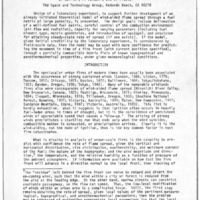-
Title
-
Wind-Aided Flame Spread Across Strewn Debris
-
Report Number
-
CONF-8305107, p. 170-175
-
Creator
-
Carrier, G.
-
Fendell, F.
-
Fleeter, R.
-
Corporate Author
-
TRW Space and Technology Group
-
Laboratory
-
Lawrence Livermore National Laboratory
-
Date
-
1983
-
Date Issued
-
1983-07
-
Extent
-
6
-
Identifier
-
ADA132780
-
Format
-
1 online resource (6 pages)
-
Abstract
-
Design of a laboratory experiment, to support further development of an already initiated theoretical model of wind-aided flame spread through a fuel matrix of large porosity, is presented. The design goals include delineation of a well-defined fuel matrix, careful control of the combustion environment (air flow and radiation), capacity for varying parameters (including fuel element type, matrix geometries, and introduction of upslope) , and provision for attaining steady-state rate of spread (if one exists). If the model , given initial credibility by the laboratory experiment, is corroborated by field-scale data, then the model may be used with more confidence for predicting the movement in time of a fire front (with current position specified), through a partially combustible debris field of known topographical and aerothermochemical properties, under given meteorological conditions.
-
Description
-
Design of a laboratory experiment, to support further development of an already initiated theoretical model of wind-aided flame spread through a fuel matrix of large porosity, is presented. The design goals include delineation of a well-defined fuel matrix, careful control of the combustion environment (air flow and radiation), capacity for varying parameters (including fuel element type, matrix geometries, and introduction of upslope) , and provision for attaining steady-state rate of spread (if one exists). If the model , given initial credibility by the laboratory experiment, is corroborated by field-scale data, then the model may be used with more confidence for predicting the movement in time of a fire front (with current position specified), through a partially combustible debris field of known topographical and aerothermochemical properties, under given meteorological conditions.
-
Distribution Classification
-
1
-
Distribution Conflict
-
No
-
DTIC Record Exists
-
No
-
Illinois Tech Related
-
No
-
Photo Quality
-
Not Needed
-
Report Availability
-
Full text available
-
Type
-
article
 article25
article25